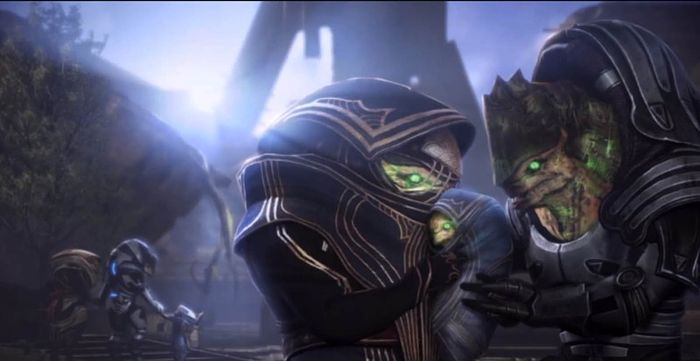Trending
Opinion: How will Project 2025 impact game developers?
The Heritage Foundation's manifesto for the possible next administration could do great harm to many, including large portions of the game development community.

Featured Blog | This community-written post highlights the best of what the game industry has to offer. Read more like it on the Game Developer Blogs or learn how to Submit Your Own Blog Post
Discussion of how the new ending to Mass Effect 3 takes games down a notch in their quest to becoming an legitimate art form. NOTE: spoilers included.

[Discussion of how the new ending to Mass Effect 3 takes games down a notch in their quest to becoming an legitimate art form. NOTE: spoilers included.]

I just spent the afternoon re-living some of the most touching and painful gamic moments of my life because the internet decided it didn't like the original ending to the game. Sci-fi worlds are incredibly difficult to bring to a close, this I can completely understand. Especially in a world as complex and defined as that in the Mass Effect series, it is understandable that any unanswered questions could be problematic.
My take on the Extended Cut is that Bioware wanted to have an ambiguous and grandiose ending, but didn't want to leave the players hanging completely in terms of what happened to their beloved crew, which is why I believe it ended originally, the way it did.
This instinct obviously didn't work out, as in any sci-fi universe, all or nothing is really the way to go. I personally enjoyed the ambiguity of the ending and thought the complaints about it were unprecedented and childish.
Bioware, I wish they hadn't hurt your feelings, because you did a good job and the new ending is, quite frankly a little silly. My biggest problem with this entire debacle is that video games are finally beginning to be taken a little more seriously by the general public, and is not being as discredited as an art form as it once was.
I think all of us gamers can agree that this is a good thing. However, when a piece of art is allowed to be comprised by the complaints of the general public, I believe it loses a lot of it's integrity and puts games back into a more juvenile category of creation.
Nobody wrote an angry letter to Ingmar Bergman asking him to explain the ending to Persona more clearly, or got mad at the end of 2001: A Space Odyssey. A good piece of art should always be open to interpretation, and that's exactly what the original ending to Mass Effect offered it's fans.
After so many hours of excellent gameplay, character development, and amazing adventures, does it really matter how Garrus got to that island? What the new ending gives us is that oh-so-important explanation, and a lovely photo montage where what exactly happened after you fire the crucible is explained to you as if you were a child. After the island scene, I honestly found myself laughing aloud at the ridiculousness that was the added explanation.
What does a piece of art give us if it doesn't leave us with any questions? Especially in a sci-fi universe, that has endless possibilities, do we really want to be able to completely close the book without being able to fill in any of the blanks for ourselves?
After watching the original ending where the little boy is looking up at the stars talking to his Grandfather, my head filled with thoughts of how the universe would rebuild itself and how things would be different in the cycles to come.
Watching a still image of a smiling Krogan, and a giant Reaper vessel picking up a shovel to help rebuild the world so easily, gives me nothing but a generic sense of complete closure of the series that left me feeling robbed of it's depth.
Bioware stated that this is not something they plan to do in the future and I am glad to hear it. I know it's all fun and games to complain about stuff on the internet, but brash anger and ignorant comments is not the way to help videogames become a serious art form, which they truly deserve to be. Everyone is entitled to their opinion, but there is always fan fiction if you want to answer all the questions yourself.
You May Also Like